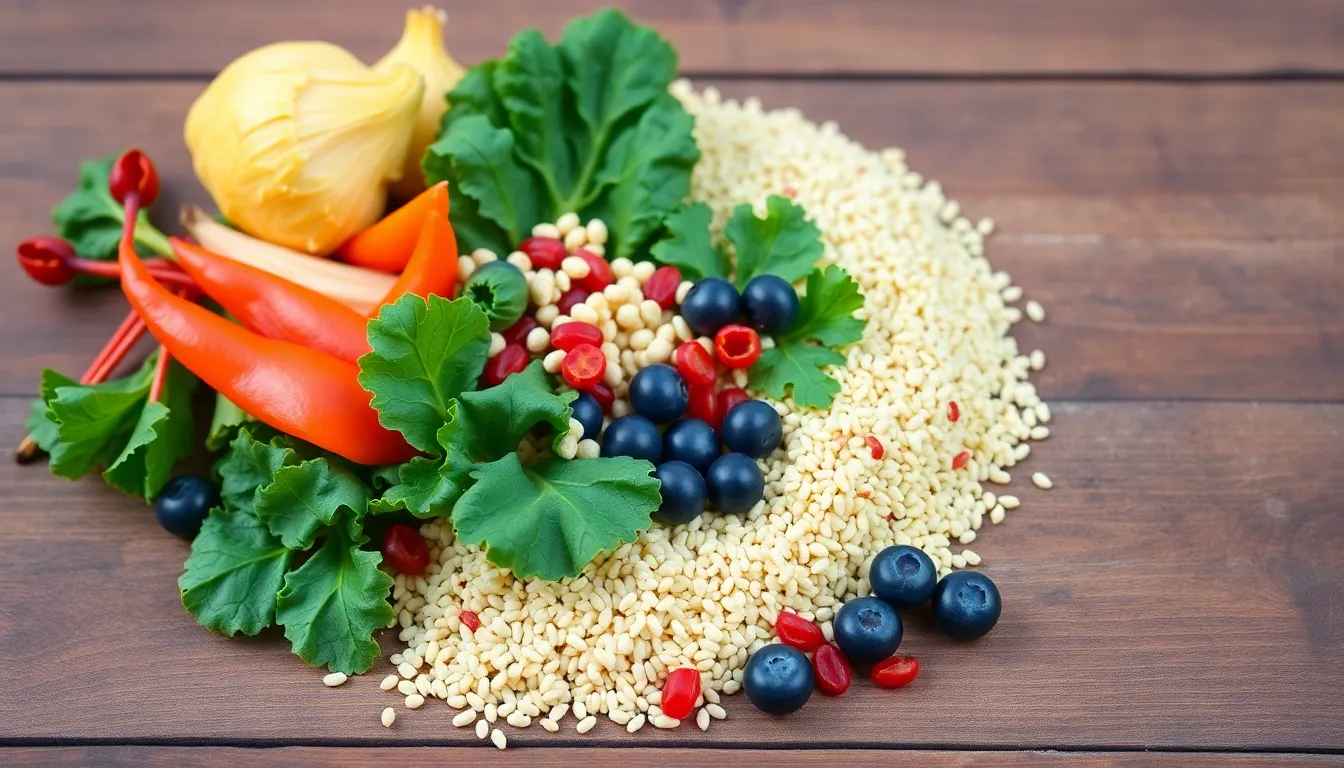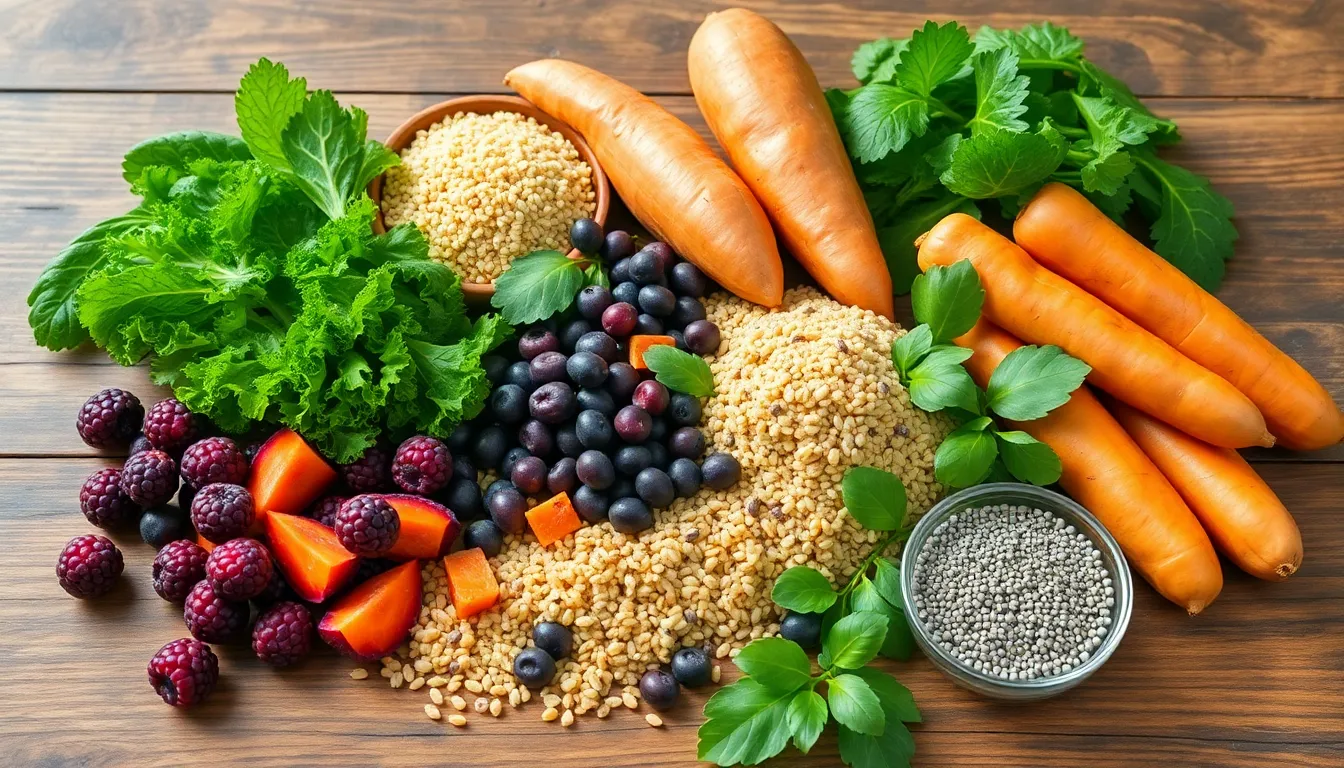Table of Contents
ToggleSuperfoods are like the superheroes of the food world—packed with nutrients and ready to save your health one bite at a time. Forget about bland diets and tasteless kale; these vibrant foods are here to make eating healthy an adventure. From acai berries that could rival a Marvel character to quinoa that’s more versatile than your favorite sidekick, superfoods promise to boost energy, fight off illness, and keep those pesky cravings at bay.
What Are Superfoods?
Superfoods refer to nutrient-dense foods that provide significant health benefits. These foods often contain high levels of vitamins, minerals, and antioxidants. Acai berries, for example, are known for their antioxidant properties, which help combat oxidative stress. Quinoa is another superfood that stands out because of its high protein content and essential amino acids.
Studies demonstrate that incorporating superfoods into meals can boost energy levels and support overall wellness. Chia seeds, rich in omega-3 fatty acids, promote heart health while helping maintain healthy cholesterol levels. Leafy greens, like kale and spinach, are celebrated for their high vitamin K content, which aids in bone health.
Moreover, superfoods aid in disease prevention. The regular consumption of berries has been linked to a reduced risk of chronic illnesses, such as heart disease and diabetes. Sweet potatoes, packed with beta-carotene, contribute to improved immune function.
Including a variety of superfoods in the diet can also enhance appetite control. Foods like avocados provide healthy fats that help keep hunger at bay. Beans and legumes are excellent sources of fiber, which supports digestive health and promotes satiety.
Superfoods play a crucial role in enhancing health and well-being. By integrating these foods into everyday meals, individuals can experience the joy of healthy eating while reaping the many benefits they offer.
Nutritional Benefits of Superfoods

Superfoods offer numerous nutritional benefits, making them integral to a healthy diet. They support overall health and enhance the body’s functions in various ways.
Vitamins and Minerals
Superfoods are rich in essential vitamins and minerals. For example, kale provides vitamins A, C, and K, which play a vital role in immune function and bone health. Quinoa contains significant amounts of magnesium and phosphorus, important for energy production and bone structure. Nutrient-dense foods like spinach boost iron levels, crucial for oxygen transport in the blood. Blueberries offer vitamin C and fiber, contributing to healthy digestion and skin health. Inclusion of diverse superfoods ensures a well-rounded nutrient profile in daily meals.
Antioxidants and Phytochemicals
Antioxidants and phytochemicals in superfoods help combat oxidative stress. Blueberries are packed with anthocyanins, known for their ability to reduce inflammation and lower disease risk. Green tea contains catechins, which support metabolism and weight management. Goji berries provide beta-carotene, essential for eye health and immune support. Incorporating these foods into the diet enhances the body’s defenses against chronic diseases. Regular consumption of antioxidant-rich superfoods can lead to improved overall wellness and longevity.
Popular Superfoods
Superfoods are widely recognized for their exceptional health benefits. Several categories, including berries, leafy greens, and nuts, showcase nutrient-rich options beneficial for daily consumption.
Berries
Berries stand out as some of the most antioxidant-rich superfoods available. Blueberries contain high levels of anthocyanins, which combat oxidative stress. Strawberries provide high vitamin C content, supporting immune health. Raspberries are excellent sources of fiber, promoting digestive health while also helping regulate blood sugar levels. Regular intake of these fruits correlates with a reduced risk of chronic diseases like heart disease and diabetes. Including a variety of berries in the diet enhances overall nutrition and adds natural sweetness to meals.
Leafy Greens
Leafy greens contribute essential vitamins and minerals to any diet. Kale is particularly high in vitamins A, C, and K, each playing a crucial role in bodily functions. Spinach brings iron and magnesium, promoting energy levels and muscle function. Swiss chard provides an array of nutrients, including potassium, which supports heart health. Consuming an assortment of leafy greens helps ensure a diverse intake of nutrients. Regularly incorporating these greens into meals can significantly enhance overall health and well-being.
Nuts and Seeds
Nuts and seeds serve as powerhouse additions to a diet rich in essential fats and nutrients. Walnuts, for example, contain alpha-linolenic acid (ALA), which supports heart health. Almonds are rich in vitamin E, an antioxidant that protects cells from damage. Chia seeds provide a high fiber content, promoting satiety and digestive health. Flaxseeds contain lignans, which may help in hormone balance. Incorporating these nutrient-dense foods into snacks or meals boosts nutrient intake and contributes to long-term wellness.
How to Incorporate Superfoods into Your Diet
Incorporating superfoods into daily meals enhances nutrition and supports health. Simple adjustments can make a significant difference in the diet.
Simple Recipes
Smoothies provide an easy way to include superfoods. Blend spinach, bananas, and almond milk for a nutrient-rich drink. Overnight oats made with chia seeds, berries, and rolled oats offer a filling breakfast option. Quinoa bowls serve as a versatile dish; combine cooked quinoa with roasted sweet potatoes and black beans for a delicious lunch. Bake snacks like kale chips seasoned with olive oil and sea salt for a healthy alternative to traditional chips.
Meal Planning Tips
Planning meals in advance streamlines incorporating superfoods. Start by selecting a few superfoods for the week, such as leafy greens, berries, and nuts. Prepare a shopping list based on these choices. Cook large batches of quinoa or lentils to use in various meals throughout the week. Incorporate superfoods into favorite recipes; for instance, add spinach in pasta dishes or sprinkle berries on yogurt. Storing pre-portioned snacks, like mixed nuts or energy balls made with dates and seeds, offers healthy grab-and-go options.
Embracing superfoods can truly elevate one’s health journey. These nutrient-dense foods not only provide essential vitamins and minerals but also make healthy eating enjoyable and exciting. By incorporating a variety of superfoods into daily meals, individuals can experience increased energy levels and improved overall wellness.
With simple recipes and meal planning tips, integrating superfoods into everyday life becomes effortless. The benefits extend beyond just nutrition; they offer a delicious way to support long-term health goals. Making these vibrant foods a staple in the diet can lead to a transformative experience, turning healthy eating into a delightful adventure.






